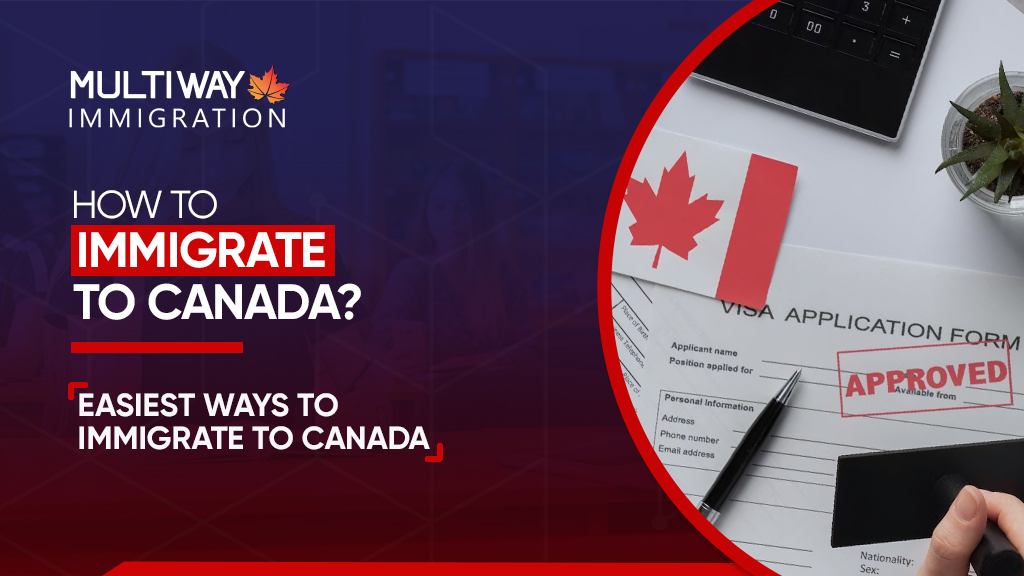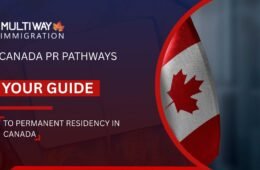
Canada is undeniably one of the world’s most sought-after destinations for immigrants.
A new national immigration plan will be implemented in 2023 with the goal of welcoming 465,000 new immigrants into the country.
In two years’ time, this target will have increased to 485,000 and then another year later that number will hit 500,000. This initiative also seeks to direct a larger portion of newcomers to areas like small towns and rural regions throughout the land.
Although it may appear challenging how to immigrate to Canada, achieving immigration to Canada is indeed possible. Numerous pathways exist, but this article will concentrate on the Federal Skilled Worker route within the Express Entry (EE) program, assuming you are presently residing outside of Canada.
How to Immigrate to Canada?
You can immigrate to Canada using the following immigration processes.
- Via Express Entry
- Through family sponsorship
- Getting nominated by a province
- Using Quebec skilled worker program
- Through Atlantic immigration program
- Immigrate as a caregiver
- Get a start-up visa
- Using the Refugee program
- Become a Agri-Food Pilot
Is Canada Worth Moving To?
Many immigrants choose Canada for its safety, ranking seventh in the world by U.S. News. While crime exists, violent incidents are rare, and it holds the twelfth spot on the 2022 Global Peace Index.
Understanding the Comprehensive Ranking System (CRS) Score
The Comprehensive Ranking System (CRS) is a tool utilized by Immigration, Refugees, and Citizenship Canada (IRCC) to rank profiles within the Express Entry pool. It assigns points to candidates based on factors like age, language proficiency, work experience, education, and ties to Canada.
Regular Express Entry draws, held approximately every two weeks, issue Invitations to Apply (ITAs) to candidates in the pool with the highest CRS scores.
| Factor | Express Entry | Provincial Nominee Program |
| Age | Up to 12 | Up to 10 |
| Education | Up to 25 | Up to 12 |
| Work experience | Up to 12 | Up to 10 |
| Language skills | Up to 24 | Up to 10 |
| Canadian experience | Up to 6 | Not applicable |
| Spousal or common-law partner | Up to 5 | Not applicable |
| Children | Up to 5 | Not applicable |
| Connections to the province or territory | Not applicable | Up to 10 |
To immigrate to Canada under the Express Entry system, you must score at least 67 points. The minimum number of points required to be nominated by a province or territory varies from province to province.
What Constitutes a Good CRS Score?
A “good” CRS score can vary. The minimum CRS score needed to receive an ITA can change with each draw. In the past, it has ranged from as low as 75 to as high as 468 points. As the CRS cut-off is unpredictable, it’s crucial to maximize your score.
Is There a Minimum CRS Score to Enter the Pool?
There’s no minimum CRS score to join the Express Entry pool. The cut-off fluctuates with each draw. A higher CRS score increases your chances of receiving an ITA.
Boosting Your CRS Score
You can enhance your CRS score within the Express Entry pool. Points are linked to language proficiency, education, work experience, and age.
Additional points can come from factors like having a Canadian sibling, fluency in French, a job offer, or nomination from a Provincial Nominee Program (PNP).
The Role of Provincial Nominee Programs (PNP)
PNPs provide pathways to permanent residency for Express Entry candidates with lower CRS scores. A PNP nomination can add 600 points to your CRS score, ensuring an ITA.
CRS Score with a Spouse
CRS points differ for single and married applicants. If your spouse is a Canadian citizen or resident, you’ll earn points as a single applicant. When applying with a spouse, ensure they provide language results and education credentials to maximize your points.
Why Your CRS Score Might Be Low
Several factors can lead to a lower CRS score. Reviewing maximum CRS points against your score can pinpoint areas for improvement. Candidates often raise their scores by gaining work experience, retaking language exams, securing a Canadian job offer, or studying in Canada. Improvement is always possible!
CRS Score Requirements for PNPs
Provinces set their PNP eligibility criteria. Some programs use the Express Entry system and may consider CRS scores among other factors. Minimum CRS score requirements vary, like Ontario’s minimum of 400 or Alberta’s minimum of 300. These scores may change, so it’s essential to stay informed.
Easiest Way to Immigrate to Canada
1. Express Entry Program – Pathway for Professionals and Trade Workers
This system stands out as the fastest route for skilled workers to secure Canadian residency, often facilitating the transition in as little as six months, making it widely regarded as the most accessible means to obtain Canadian Permanent Residency.
Under this category, immigration is executed through a point-based evaluation system that employs the Comprehensive Ranking System (CRS) tool. This sophisticated tool calculates candidates’ scores, considering key factors like age, language proficiency, work experience, and educational qualifications. The minimum score deemed eligible for immigration is determined by the Immigration, Refugee, and Citizenship Canada (IRCC). Applicants who attain or exceed this threshold are considered well-suited for immigration and subsequently receive an Invitation to Apply (ITA) for Canada PR Visa. Consequently, the Express Entry program has garnered a reputation as the most straightforward avenue how to immigrate to Canada.
As of the latest update, the Canada Express Entry Draw held on August 15, 2023, revealed a CRS score requirement of 496. Once an applicant attains this score, they can seamlessly commence the Canada PR visa application process.
Regarding language proficiency, it is noteworthy that Canada recognizes two official languages, English and French. However, English predominates as the predominant language spoken throughout the country.
Therefore, individuals who are not proficient in English may find it advantageous to consider enrolling in English language classes before embarking on their journey to Canada.
2. Provincial Nomination Programme – An Alternative to Meet Immigration Requirements
The Canada Provincial Nominee Program (PNP) serves as an invaluable alternative for individuals who may not meet the prerequisites of the Express Entry system. It is widely regarded as one of the most accessible avenues for immigration to Canada. Under this program, Canadian provinces are granted the authority to select and nominate skilled individuals for immigration, based on the specific labor market needs and in-demand occupations within their respective regions.
Upon receiving provincial nomination, candidates gain a substantial advantage in the Express Entry immigration system by earning an additional 600 points. This remarkable boost enhances their prospects of being invited to apply for Permanent Residency (PR) in Canada.
Immigration within this category operates on a point-based evaluation system, facilitated by the Comprehensive Ranking System (CRS) tool. This tool meticulously assesses candidates based on critical factors such as age, language proficiency, work experience, and educational qualifications. The minimum eligible CRS score is determined by the Immigration, Refugee, and Citizenship Canada (IRCC), and applicants who meet or surpass this threshold are deemed suitable for immigration and subsequently receive an Invitation to Apply (ITA) for a Canada PR Visa.
While the Express Entry program remains renowned as the most efficient route to how to immigrate to Canada, it is noteworthy that the latest Express Entry Draw, conducted on August 15, 2023, revealed a CRS score requirement of 496. Upon achieving this score, candidates can seamlessly apply for Canada PR visa.
Regarding language proficiency, it’s important to recognize that Canada recognizes two official languages, English and French. However, English predominates as the most widely spoken language throughout the country. For individuals who are not proficient in English, considering enrollment in English language classes before their relocation to Canada can be a beneficial step.
3. Business Investor Program – Minimum Investment of CAD$150,000
Aspiring entrepreneurs and investors can explore the Business Investor Program, which offers a path to PR starting with a minimum investment of CAD$150,000. This program encourages economic growth and development.
4. Work Permit – Securing PR through LMIA from a Canadian Employer
The Work Permit route is accessible to candidates with a job offer from a Canadian employer who has obtained a Labor Market Impact Assessment (LMIA). Gaining Canadian work experience can be a stepping stone to PR.
5. Study Visa – Undergraduate or Graduate Pathway to PR
International students pursuing undergraduate or graduate studies in Canada can utilize the Study Visa as a stepping stone to PR. It provides an opportunity to gain Canadian education and valuable experience.
6. Visitor Visa – Transitioning to PR via LMIA After Arrival
A Visitor Visa opens doors to explore Canada initially. Some individuals may transition to PR after securing a job offer with an LMIA from a Canadian employer, thereby converting their status.
7. Atlantic Immigration Nominee Program (AIP) – A Regional Opportunity for PR
The Atlantic Immigration Nominee Program (AIP) is a regional immigration pathway designed for individuals interested in settling in the Atlantic provinces of Canada. It caters to various skill levels and occupations, making it a versatile option for PR seekers.
Canada Immigration Eligibility Checklist
- Research and Choose a Province: Determine which Canadian province you plan to move to, as different provinces may have specific immigration programs and requirements.
- Eligibility Assessment: Check if you meet the eligibility criteria for your chosen immigration program. This could be Express Entry, Provincial Nominee Program (PNP), Family Sponsorship, or others.
- Language Proficiency: Verify your language proficiency by taking a language test like IELTS or CELPIP for English or TEF for French, depending on the language requirements of your immigration program.
- Education Credentials: Get your educational credentials assessed by an authorized organization to ensure they meet Canadian standards.
- Create Express Entry Profile: If you are applying through Express Entry, create an online profile and enter your details in the Express Entry pool.
- Job Search: Start looking for job opportunities in Canada if applicable to your immigration program. Networking and applying for jobs in your field can be crucial.
- Financial Preparation: Ensure you have enough funds to cover initial expenses upon arrival, including accommodation, transportation, and living expenses until you find employment.
- Healthcare: Understand Canada’s healthcare system and make sure you have health insurance coverage when you arrive, as there may be a waiting period for government healthcare
- Arrange Housing: Secure temporary or permanent housing in Canada before your arrival, if possible.
- Immigration Documents: Gather all required documents, including your passport, visa, and any supporting documents for your specific immigration program
- Police Clearance: Obtain police clearance certificates from all the countries you have lived in for an extended period
- Medical Examination: Complete a medical examination if required as part of your immigration application
- Travel Arrangements: Book your flight to Canada and plan your travel logistics
- Settlement Services: Research and contact settlement agencies or organizations in your chosen province for support with your settlement process
- Banking and Finances: Open a Canadian bank account and understand the Canadian banking system
- Driver’s License: Familiarize yourself with the process of obtaining a Canadian driver’s license if needed
- Children’s Education: Research and enroll children in Canadian schools or childcare facilities if you have children
- Networking: Join local immigrant and community groups to connect with fellow newcomers and access valuable resources
- Cultural Adaptation: Prepare for cultural differences and adapt to the Canadian way of life
- Legal Requirements: Be aware of any legal obligations in Canada, such as tax filing requirements
- Enjoy the Journey: Embrace the opportunity and enjoy your journey to Canada. It’s a diverse and welcoming country with plenty to offer
What is the Main difference between Multiway and Other Competitors?
Multiway Immigration Services operates as a reputable immigration consultant in edmonton, dedicated to aiding both individuals and businesses in navigating the complexities of Canadian immigration.
While they do not administer their own immigration programs, they specialize in facilitating applications for a diverse range of Canadian immigration pathways, including the Federal Skilled Worker Program, Provincial Nominee Programs for Business, and the Atlantic Immigration Pilot Program.
Their comprehensive suite of services encompasses:
- Consulting: Multiway Immigration Services offers a comprehensive eligibility assessment, guiding clients through the intricate landscape of Canadian immigration. They tailor individualized immigration strategies based on each applicant’s unique circumstances.
- Application Processing: Clients benefit from expert assistance in preparing and submitting their immigration applications. The firm ensures that all necessary documentation is accurate and complete.
- Case Management: Multiway Immigration Services provides invaluable ongoing support and guidance throughout the immigration journey. Their dedicated case managers offer continuous assistance to address any concerns or queries that may arise.
- Visas: The firm extends its expertise to visa applications, including Canada Work Permit, Canada study permit, and visitor visas for those seeking temporary stays in Canada. They streamline the application process for clients.
- Resettlement Services: Multiway Immigration Services assists with the essential aspects of settling in Canada, including finding suitable housing, securing employment opportunities, and establishing banking arrangements.
Multiway Immigration faces competition from several notable players in the Canadian immigration consultancy industry. Here are some of its key competitors:
- CanAm Immigration: With over a quarter-century of experience, CanAm Immigration stands as a well-established Canadian immigration consultancy firm. They are licensed RCICs (Regulated Canadian Immigration Consultants) and provide an array of immigration services, encompassing consultation, application processing, and proficient case management.
- ICCRC: The Immigration Consultants of Canada Regulatory Council (ICCRC) operates as a non-profit organization representing over 2,500 Canadian immigration consultants. They serve as a resource hub offering information and directories of RCICs, aiding individuals in finding suitable immigration professionals.
- Arrived Canada: Arrived Canada specializes in supporting newcomers to Canada in their settlement and adjustment processes. Their services extend beyond immigration consulting to include language training and assistance with job placement, contributing to a holistic approach to integration.
- World Immigration Services: Boasting a decade of experience, World Immigration Services is another Canadian immigration consultancy firm that offers a broad spectrum of services. This includes consultation, application processing, and adept case management, enhancing their appeal to prospective immigrants.
- VisaPlace: VisaPlace operates as an online immigration consultancy firm, offering a range of immigration services, including consultation, application processing, and effective case management. While they are not licensed RCICs themselves, they collaborate with a network of RCICs to deliver their services.
Here is a table summarizing the key differences between Multiway Immigration and some of its competitors:
| Feature | Multiway Immigration | CanAm Immigration | ICCRC | Arrived Canada | World Immigration Services | VisaPlace |
| Experience | Over 20 years | Over 25 years | Over 20 years | Over 10 years | Over 10 years | N/A |
| Reputation Fees | Good
Competitive |
Good
Competitive |
GoodNN/A | Good
Affordable |
Good
Competitive |
Affordable |
| Services | Wide range | Wide range | Information and resources | Settlement and adjustment | Wide range | Online services |
| Specialties | Skilled workers, business immigrants, families | Skilled workers, business immigrants, families | All immigration programs | Newcomers to Canada | Skilled workers, business immigrants, families | All immigration programs |
Important Things to Know When Moving to Canada
Navigating the process of moving to Canada involves several critical steps. To ensure a successful transition, it’s imperative to follow a systematic approach:
- Select the Appropriate Immigration Program: With numerous immigration programs available, it is essential to meticulously choose the one that aligns best with your circumstances. Popular options include the Federal Skilled Worker Program, Provincial Nominee Programs, and the Family Class Sponsorship Program.
- Fulfill Eligibility Criteria: Each immigration program has its distinct eligibility criteria, which must be met to qualify for application. Typical prerequisites include meeting educational benchmarks, demonstrating work experience, and proving language proficiency.
- Compile Essential Documentation: Preparing comprehensive documentation is pivotal for your immigration application. This dossier typically encompasses vital records such as your passport, birth certificate, educational transcripts, employment verification letters, and language proficiency test results.
- Secure a Visa or Work Permit: For non-Canadian citizens or permanent residents, obtaining a visa or Canada Work Permit Applications is a preliminary step before settling in Canada. The specific type of visa or work permit required hinges on the chosen immigration program.
- Facilitate Your Relocation: Following approval of your visa or work permit, you can initiate the process of moving to Canada. This encompasses essential tasks such as securing accommodation, seeking employment opportunities, and establishing a bank account.
In addition to these fundamental steps, several considerations should inform your decision to move to Canada:
- Cost of Living: Be aware that the cost of living varies across different Canadian cities and provinces. Generally, Canada tends to have a higher cost of living compared to many other countries.
- Climate: Canada boasts a diverse climate range, from the frigid winters in the northern regions to milder winters in the south. Carefully consider your climate preferences when choosing your destination in Canada.
- Cultural Diversity: Canada’s multicultural fabric means that you will encounter people from various cultural backgrounds and nations. Embrace the rich tapestry of cultures and communities that thrive in Canada.
- Language: While Canada has two official languages, English and French, English predominates as the most widely spoken language. If you are not proficient in English, it may be beneficial to consider English language classes before your move.
In sum, meticulous planning and adherence to the immigration process are pivotal to a smooth transition to Canada. These considerations ensure that you are well-prepared to embrace the opportunities and challenges that lie ahead in your new Canadian journey.
Get in Touch with Us Now
With a wide range of services spanning consultation, application processing, case management, visa assistance, and resettlement support, Multiway Immigration caters to how to immigrate to Canada.
Our commitment to personalized immigration plans and ongoing assistance throughout the immigration process underscores their client-centric approach.
As individuals and businesses contemplate their immigration journey to Canada, Multiway Immigration stands as a reliable ally, offering guidance, expertise, and support to make the transition to Canada smoother and more successful.
Our dedication to helping clients achieve their Canadian immigration goals underscores our commitment to excellence in the field.
FAQs
What are Trusted Immigration Services?
Trusted Immigration Services are professional firms or consultants in Canada that assist individuals and families with various aspects of immigration, including family sponsorship and other immigration programs.
How do I find a trusted Canada Immigration Consultant?
To find a trusted Canada Immigration Consultant, you can start by checking the Immigration Consultants of Canada Regulatory Council (ICCRC) website, which lists licensed consultants. Additionally, seek recommendations from friends or family who have used immigration services.
What is Canada Family Sponsorship?
Canada Family Sponsorship is a program that allows Canadian citizens and permanent residents to sponsor their eligible family members for immigration to Canada. This program helps reunite families in Canada.
Can a Canada Immigration Agency assist with Family Sponsorship applications?
Yes, many Canada Immigration Agencies have experienced consultants who can assist with Family Sponsorship applications, ensuring they are prepared correctly and submitted on time.
Are Immigration Consultants licensed and regulated?
Yes, Immigration Consultants must be licensed and regulated by the Immigration Consultants of Canada Regulatory Council (ICCRC) to provide immigration services.
How can I verify if a Canada Immigration Agency is trustworthy?
To verify the trustworthiness of a Canada Immigration Agency, you can check for their ICCRC license, read client reviews and testimonials, and inquire about their track record and experience in immigration services.
What services can I expect from a Immigration Services provider?
Service providers typically offer a range of services, including consultation, application assistance, document preparation, case management, and guidance throughout the immigration process.
How can a Canada Visa Consultant help me with my immigration goals?
A Canada Visa Consultant can help you by assessing your eligibility for various immigration programs, preparing your application accurately, and providing expert guidance to increase your chances of a successful immigration process.
What are the benefits of using a Immigration Services provider for immigration to Canada?
Benefits of using Immigration Services include expert guidance, a higher likelihood of success, reduced errors in applications, and peace of mind during the immigration process.
How do I start the immigration process with a Immigration Services provider?
To start the immigration process with a Immigration Services provider, you can typically begin with a consultation. During this consultation, your eligibility and immigration options will be assessed, and a customized plan will be developed to meet your goals.





